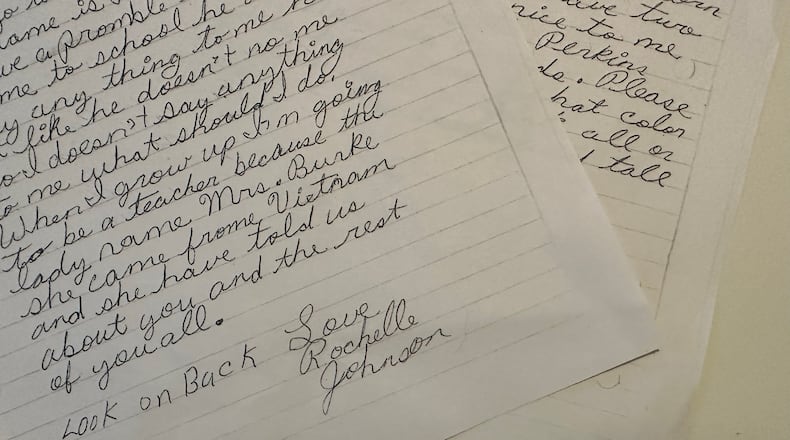I love taking a deep dive into history. Sometimes, I receive emails from readers that prompt me to do just that.
In this case, an attorney in Yakima, Washington, wrote to me about a letter that he received from an 11-year-old in Atlanta.
Russell Mazzola found it while looking through his old war memorabilia. In 1969, he was in Vietnam, serving with Hotel Company, 2nd Battalion, 3rd Marines. In the spring of that year, he got a letter from a student named Rochelle Johnson, who attended Terry Mill Elementary School.
Mazzola isn’t sure if he wrote her back, but he thought enough of her letter to hold on to it for all these years. He figured maybe, if he didn’t write back then, he could at least try to connect with her now.
“It was a sweet thing that the teacher did — to have the kids write the letters,” Mazzola said when we talked. “I just thought, if I was the student and had written the letter, it would be meaningful to and of interest to me to have someone reconnect with me from that many years back.”
I agreed, largely because I wondered if little Rochelle had any idea that her letter would be significant enough for someone to save. I thought of all the ways — positive and negative — that we impact other people’s lives, even if we never know it. If we could know it, would it compel us to offer more kindness to each other?
In 1969, the tides were changing in the Vietnam War. Richard Nixon had been sworn in as president and sought to end U.S. military involvement there through negotiations or turning combat over to the South Vietnamese.
In the summer of that year, the Marine Corps’ role in the war would be greatly reduced. But that spring, Mazzola and his fellow Marines were still seeing action.
On March 17, Johnson composed her letter. On wide-ruled notebook paper, she wrote neat blocks of text in cursive.
“When I grow up, I’m going to be a teacher because the lady named Mrs. Burke, she came from Vietnam and she have (sic) told us about you and the rest of you all,” wrote Johnson, likely referring to the teacher who gave the class the writing assignment.
It seems Johnson also had seen images of the troops at war. “I think all of you are handsome and tall,” she wrote.
Johnson told Mazzola about the rest of her typical pre-teen life — her friends, her boy problems and some of the latest dances, including the popcorn and the four corners.
“Please come home soon,” she wrote. And another request, “I want you to right (sic) me back please.”
Mazzola can’t remember his reaction to Johnson’s letter at the time, but he managed to bring it home with his other possessions.
Johnson’s letter was lighthearted — reflecting a child’s view of the world. But major cultural shifts were happening around her.
DeKalb County had begun to desegregate schools and had reassigned some students to neighborhood schools. Terry Mill Elementary, where Johnson attended school, was 76% Black, the highest percentage in the district, and an indication that desegregation efforts were inconsistent.
Credit: Courtesy of Rochelle Johnson
Credit: Courtesy of Rochelle Johnson
Rochelle Johnson’s family had been among the first Black families to live on her block, she said. White flight quickly followed. Johnson, 66, said family members still live in the house on Fayetteville Court. She graduated from Gordon High School and went on to work in the health care industry.
Johnson left Atlanta in 1989 to live in Florida, where she married and became an adoptive parent. But in 2004, after her divorce, she returned to the city. Now, she works with private clients and spends her downtime dabbling in Atlanta’s film industry.
She thought I was prank calling her when I left messages about the letter, but she called me back during an afternoon run to Waffle House. She agreed to let me share her email address with Mazzola. She doesn’t remember writing the letter. Even the names of friends and the teacher she mentioned were a faded memory.
But she was pleased that sharing that bit of her life at that moment in time may have offered hope to someone else. It goes to show that small actions can sometimes deeply touch those around us.
“That is amazing. I am really humbled about it,” Johnson said. “That is amazing to know that I made a difference in his life when I was 11 years old.”
Read more on the Real Life blog (www.ajc.com/opinion/real-life-blog/) and find Nedra on Facebook (www.facebook.com/AJCRealLifeColumn) and Twitter (@nrhoneajc) or email her at nedra.rhone@ajc.com.
About the Author
Keep Reading
The Latest
Featured





